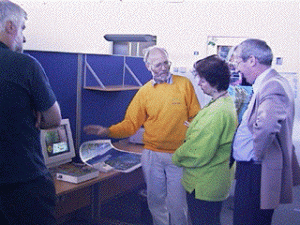News Story
Visitors witness Volcanic Edinburgh
Tuesday 4 Nov 1997
Dr. Stuart Monro, Scientific Director, and Nina Ludgate (Event Communications) visited KMi’s MultiMedia Enabling Technologies group to see protoype material for the Volcanic Edinburgh part of the exhibition currently under construction for the Dynamic Earth project in Edinburgh.
A web page for the project, with sample QTVR movies, can be viewed at http://met.open.ac.uk/met_vr/v r_earth.html
Later, they went on to Earth Sciences to see other geological materials in use in OU courses.
The photo shows, left to right, Dr. Peter Whalley (MET group), Dr. Dave Williams (Earth Sciences), Nina and Dr. Monro looking at a custom interface for an Apple Pippin low-cost computer running a QTVR/Director virtual tour of Walton Church.
Latest News
PhD Awarded for Groundbreaking Research on Game-Based Cyber Security Training
KMi at the Palace of Westminster: Exploring Blockchain for Society and Economy
OUAnalyse at the Digital Ethics Summit 2025: Advancing Responsible AI in Education

